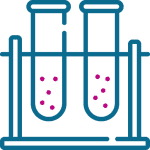Triiodothyronine (FT3)
It is a thyroid hormone produced in the tissues from thyroxine. Testing for free triiodothyronine is more accurate than total triiodothyronine. It is prescribed when thyroid disease is suspected.
20,00 €

Triiodothyronine (T3) is a thyroid hormone produced in the tissues. Thyroxine (T4) and triiodothyronine are important for normal body development and metabolism. Both hormones are involved in the body’s energy processes – constricting blood vessels, raising blood pressure, helping to maintain normal heart rate, muscle tone, digestive and reproductive functions. Triiodothyronine alone is rarely tested, and is most often used in combination with free triiodothyronine (FT3) to assess the risk of thyroid and cardiovascular disease.
Triiodothyronine (T3) is a thyroid hormone produced in tissues (liver, kidney, connective tissue cells). T3 has similar peripheral effects to T4. It is rarely detected in uncertain cases and when the results of other hormones are known.
The most important diagnostic application of FT3 is the diagnosis of triiodothyronine toxicosis. Triiodothyronine (T3) toxicosis can be suspected with TSH and FT4 testing. If FT4 is normal and TSH is low, FT3 should be tested. Elevated FT3 levels confirm triiodothyronine toxicosis (T3 toxicosis). According to various literature reports, it is approximately 20-100 times less common than T4 thyrotoxicosis.
However, it is thought to be actually more common than diagnosed. If hyperthyroidism is present, then a decrease in TSH and an increase in FT4 are detected. It necessarily involves an increase in FT3. However, in about 5-7% of cases, only one hormone, FT3, is elevated. Typical FT3 toxicosis is then identified. Sometimes, in a laboratory where FT3 is not available, it is assumed that there has been an error in the laboratory determination. TSH and FT4 are always assumed to have an inverse correlation. It is the failure to find this link that should prompt the investigation of FT3.
An FT3 test is recommended if supraventricular tachycardia or proximal myopathy is detected in the absence of elevated T4 levels.
You can consult our family doctors.
